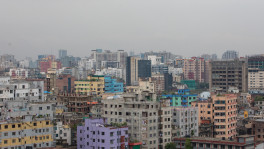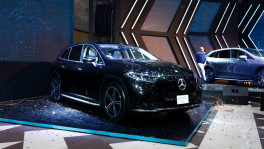Osama bin Laden’s aesthetic never died
Why young jihadists are still big fans of the long-deceased al Qaeda leader.

Two decades after the al Qaeda terror attacks on U.S. soil, and more than a decade after his death, Osama bin Laden remains central to the global jihadist movement. Bin Laden's likeness and speeches continue to be featured regularly in jihadist propaganda. Members of Generation Z regularly swap memes that revere him as authentic, courageous, and successful. As a symbol, he has transcended the rivalry between al Qaeda and the Islamic State, serving as an icon for veteran jihadists as well as those new to the movement. Bin Laden's appeal even extends beyond jihadists: he has often been lionised by violent far-right extremists, including white supremacists, neo-Nazis, and so-called "accelerationists."
The main reason for bin Laden's continued resonance is also one of the most misunderstood factors in his success as leader of al Qaeda: his careful cultivation of a stoic and eloquent self-image. In contrast to the gore and carnage favored by leaders of later terrorist groups such as the Islamic State, bin Laden concentrated on spreading quiet images of himself. The images of bin Laden sitting in a cave wearing a camouflage jacket, AK-47 by his side, still convey a sense of confidence and leadership that few jihadist leaders have been able to replicate, including al Qaeda's current emir Ayman al-Zawahiri. This distinct aesthetic legacy of bin Laden, and the way it still shapes terrorism today, deserves far more attention than it has received in the West.
Bin Laden had a firm grasp on the importance of media and propaganda, once observing that "rhetoric and satellite propaganda can be on equal footing with unmanned bombers and cruise missiles." He was also always concerned with disciplined messaging from al Qaeda and keenly understood the importance of public relations.
Nevertheless, al Qaeda's media campaigns struggled in the latter part of bin Laden's tenure. Navigating the Arab Spring protests that kicked off in 2011 occupied bin Laden's bandwidth and led many to predict al Qaeda's demise as a result. Meanwhile, the Islamic State was on the rise, producing propaganda that was slicker and more sophisticated than al Qaeda's, evoking comparisons to big box and luxury brands, Google and AOL. While ISIS harnessed the reach of social media, bin Laden's al Qaeda remained more comfortable with audio cassettes and video messages suited for an older demographic. Al Qaeda was widely perceived as a relic in the face of an aggressive onslaught by media savvy jihadis live-streaming life in their own caliphate.

But to criticise bin Laden for not having the technical skills of a millennial is to confuse the power of his message. Indeed, bin Laden's sermons, in which he addressed issues including the liberation of Palestine, the U.S. occupation of Iraq, and the corruption of apostate governments and regimes throughout South Asia, North Africa, and the Middle East, were always widely dispersed and effective at recruiting new members to al Qaeda.
His relative lack of technological sophistication may even have been a selling point. Bin Laden's reputation for eschewing creature comforts, even though he inherited millions of dollars, and his tenacious commitment to jihad and al Qaeda made him a cult hero among the "Arab Afghans" who fought to expel the Soviets from Afghanistan in the 1980s. That reputation was cemented after 9/11 and continued to grow even after he was forced into hiding. Bin Laden's relative ascetism, a common thread throughout his life, had always made him seem especially committed to the jihadist cause.
In his speeches, bin Laden spoke directly to the global Muslim community (or ummah), and frequently sought to place issues in historical context, alluding to colonial-era injustices such as the Sykes-Picot Agreement. His fatwas were successful in framing local conflicts in parts of the Muslim world as interconnected and part of a global struggle between Islam and Western countries.
But a large reason why bin Laden remains relevant to contemporary generations of jihadists is that his political priorities were specific enough to inspire passion but broad enough to transcend transitory news cycles. The grievances bin Laden highlighted have still not been mollified. Even with the United States taking steps to reduce its military footprint in the region (a development al Qaeda has already seized upon in its propaganda), Washington's support for "apostate regimes" in both Egypt and Saudi Arabia remains. This lends further credence to bin Laden's message, and plays right into the hands of those stoking the grievances of young Muslims sympathetic to jihadists' messages. Moreover, as the recent clashes between Israelis and Palestinians in May revealed, the issue of Jerusalem and Israeli occupation of Arab lands matters to Muslims from Mecca to Minnesota.
If al Qaeda continues to take advantage of the vast trove of bin Laden audiotapes, videos, and sermons, it can preserve his legacy for future generations. He is already an icon on social media, with an array of new content specifically devoted to keeping his legacy relevant for the next generation. Given the fact that al Qaeda today boasts somewhere between 30,000 and 40,000 members worldwide, it seems clear that, as Bruce Hoffman and Jacob Ware recently opined, "the narrative that bin Laden crafted continues to resonate and inspire a new generation to take up arms in a war that he first proclaimed 24 years ago — before many of these latest recruits were even born." For these young recruits, bin Laden remains at the forefront of the jihadist pantheon, 1st among equals in the history of al Qaeda's lore.
Colin P. Clarke, is the director of research and policy at the Soufan Group and a senior research fellow at the Soufan Center.
David Newman, is a research associate at The Soufan Center and a master of global policy studies candidate at the LBJ School of Public Affairs at the University of Texas, Austin.
Disclaimer: This article first appeared on Foreign Policy, and is published by special syndication arrangement.


 Keep updated, follow The Business Standard's Google news channel
Keep updated, follow The Business Standard's Google news channel















